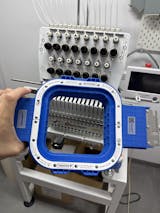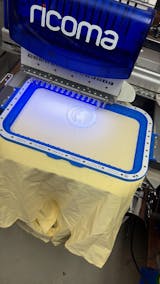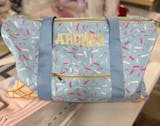1. Introduction: Navigating Wholesale Embroidery Floss for Machine Excellence
In the world of machine embroidery, the quality of your floss isn’t just a detail—it’s the backbone of every stitch, every color, and every finished masterpiece. Whether you’re running a high-volume production line or crafting boutique designs, choosing the right embroidery floss can make or break your results. This guide unpacks everything bulk buyers and machine embroiderers need: from technical breakdowns of polyester, rayon, and cotton threads, to sourcing strategies and brand comparisons that cut through the marketing noise. Along the way, you’ll discover how integrating advanced tools—like Sewtalent’s magnetic embroidery hoops—can supercharge your workflow, minimize waste, and keep your machines humming at peak efficiency. Ready to optimize your embroidery machine brands from the thread up? Let’s dive in.
Table of Contents
- 1. Introduction: Navigating Wholesale Embroidery Floss for Machine Excellence
- 2. Material Mastery: Technical Breakdown of Machine Embroidery Floss Types
- 3. Strategic Sourcing: Bulk Suppliers, MOQs & Cost Optimization
- 4. Brand Showdown: Durability, Color Consistency & Machine Compatibility
- 5. Operational Efficiency: Integrating Floss with Precision Tools
- 6. Conclusion: Building a Future-Proof Embroidery Workflow
- 7. FAQ: Wholesale Embroidery Floss Essentials
2. Material Mastery: Technical Breakdown of Machine Embroidery Floss Types
The world of machine embroidery floss is a tapestry of innovation, durability, and color science. Understanding the technical nuances of each material is the first step toward flawless, high-speed stitching and long-lasting results.
2.1 Polyester vs. Rayon vs. Cotton: Performance Under the Microscope
Let’s put the big three—polyester, rayon, and cotton—under the magnifying glass:
Polyester
- Composition: 100% polyester filament yarn, dyed with disperse dyes at high temperatures (125–135°C).
- Strengths: Superior tensile strength and a balanced twist keep threads from shredding or breaking, even during high-speed machine runs. Polyester boasts impressive color fastness, abrasion resistance, and low shrinkage—making it the go-to for jeans, shoes, hats, and other industrial applications.
- Industrial Edge: Its antistatic properties and hydrophilicity mean fewer thread breaks and smoother runs, especially on demanding fabrics.
Rayon/Viscose
- Composition: Derived from wood pulp, rayon delivers a natural, glossy sheen that makes colors pop.
- Strengths: While less durable than polyester, rayon’s vibrant stitch definition is prized for decorative and aesthetic projects.
Cotton
- Composition: 100% mercerized cotton, with a silky-smooth texture.
- Strengths: Oeko-Tex® Standard 100 certified for safety, cotton threads are bleach- and dry-cleaning-friendly—perfect for traditional embroidery that demands a natural feel.
| Parameter | Polyester (300D/3) | Rayon/Viscose | Cotton |
|---|---|---|---|
| Linear Density | 300D/3 | Varies by type | Mercerized |
| Tensile Strength | High | Moderate | Moderate |
| Shrinkage | Low | Low | Low |
| Packaging | 0.5–1 kg cones | 25g–1 kg cones | 547-yard spools |
| Certifications | – | – | Oeko-Tex® |
Why Polyester Dominates Industrial Embroidery: Polyester’s combination of strength, colorfastness, and resistance to abrasion makes it the undisputed champion in commercial settings. If you’re running high-speed machines or working with tough fabrics, polyester is your safest bet.
Maximizing Floss Durability with Sewtalent Hoops: Machine speed and tension can wreak havoc on even the toughest threads. Sewtalent’s magnetic hoops for embroidery machines act as tension stabilizers, distributing pressure evenly across the fabric. This not only prevents thread breakage but also ensures your floss maintains its integrity through every stitch—especially critical in high-volume production.
2.2 Specialty Fibers: Conductive Threads & Sustainable Innovations
The embroidery world isn’t just about tradition—it’s constantly evolving with specialty fibers and eco-friendly breakthroughs.
Recycled PET & Hybrid Threads:
- Recycled PET: Spun from transparent PET bottles, these threads are a win for sustainability. Suppliers like Amann offer recycled PET options, including conductive variants for RFID or heating applications.
- Hybrid Threads: Blends like stainless steel/polyester bring conductivity to the table, expanding embroidery’s reach into smart textiles and technical garments.
Eco-Trends & Certifications:
- Oeko-Tex® Standard 100 certification is now a must for safety and environmental responsibility.
- Precision dyeing and factory-controlled processes guarantee batch-to-batch color consistency, even at scale.
| Supplier | Color Palette | Customization |
|---|---|---|
| MH Thread | 400+ vibrant colors | Custom color matching via physical samples |
| DMC | 196 colorfast shades | Limited customization; fixed spool sizes |
| Amann | Recycled PET options | Conductive thread variants |
How Sewtalent Hoops Protect Delicate Fibers: Specialty threads—especially those with conductive or recycled components—are more prone to snagging and fraying. Sewtalent’s magnetic hoops secure fabrics with a gentle, even hold, minimizing friction and thread damage. This is crucial when working with innovative fibers that demand extra care.
3. Strategic Sourcing: Bulk Suppliers, MOQs & Cost Optimization
Bulk buying embroidery floss isn’t just about finding the lowest price—it’s about balancing supplier reliability, order flexibility, and long-term cost savings.
3.1 Alibaba Deep Dive: Negotiating MOQs from 20pc to 10,000kg
Supplier Landscape:
- Alibaba: The go-to for commercial embroidery machine for sale and direct factory access, with price ranges from $0.06 to $26.00 per unit depending on material and quantity.
Minimum Orders:
- DMC floss: as low as 20 pieces
- Polyester/rayon/cotton threads: 100–10,000 kg (MH Thread, Cinoll)
Cinoll: Notably offers a low MOQ of 500 units—ideal for startups and small businesses.
Pricing Tactics:
- EXW (Ex Works): Buyer handles all shipping from the factory—often the cheapest, but you manage logistics.
- FOB (Free On Board): Supplier covers delivery to the port; you take it from there.
- Sea Freight: Best for large orders, offering substantial savings over air.
Negotiation Tip: Always clarify payment terms and shipping responsibilities to avoid hidden costs. Don’t be afraid to request custom spool sizes or thread weights—many suppliers accommodate bespoke requests for bulk buyers.
3.2 Tiered Discounts & Quality Assurance Protocols
Volume Discounts:
- ThreadArt: Offers 10–15% off for annual purchases over $250–$500, with Silver (10%), Gold (12%), and Platinum (15%) tiers.
- The Embroidery Store: Monthly specials with up to 20% off on threads and stabilizers.
Quality Assurance:
- Sampling: Always request thread samples and pre-production prototypes to check color, weight, and material consistency.
- Third-Party Inspections: Especially for large or custom orders, independent QA firms in China can perform mid-production and final checks.
User Feedback: Some buyers report thread consistency issues with certain brands—highlighting the importance of rigorous quality control and supplier vetting.
Key Takeaway: By stacking tiered discounts, leveraging strategic shipping, and insisting on quality checks, you can drive down costs without sacrificing reliability. For startups, Cinoll’s low MOQs and ThreadArt’s volume pricing create entry points that scale as your business grows.
Ready to level up your embroidery business? In the next sections, we’ll pit top brands head-to-head and reveal how to integrate precision tools like Sewtalent for next-level efficiency. Stay tuned!
4. Brand Showdown: Durability, Color Consistency & Machine Compatibility
Choosing the right embroidery floss brand isn’t just a matter of color charts—it's about ensuring every spool stands up to the relentless pace of your machines, delivers vibrant results wash after wash, and works seamlessly with your setup. Let’s break down how the top contenders stack up in real-world machine embroidery.
4.1 Industrial Titans: Madeira Polyneon vs. Simthread vs. DMC
When it comes to machine embroidery, not all threads are created equal. The giants—**Madeira Polyneon**, **Simthread**, and **DMC**—each bring distinct strengths and limitations to the table.
**Material Matters:**
- **Polyester threads** dominate machine embroidery for a reason: they’re tough, colorfast, and built to withstand the rigors of high-speed stitching.
- **Cotton threads**, like those from DMC, shine in hand embroidery but can falter under mechanical stress, fraying or breaking more easily.
| Brand | Material | Durability | Colorfastness | Machine Compatibility |
|---|---|---|---|---|
| Madeira Polyneon | Polyester | High (chemical-resistant) | Up to 95°C wash | Industrial machines |
| Simthread | Polyester | High (reduced breakage) | Excellent | Commercial equipment |
| DMC | Cotton | Moderate | Good (hand use) | Limited (hand focus) |
| Anchor | Cotton/Metallic | Moderate | Good (hand use) | Limited (hand focus) |
**Durability & Abrasion Resistance:**
- **Madeira Polyneon** and **Simthread** polyester threads are engineered for industrial use, resisting breakage even during marathon production runs. Their chemical resistance means they survive bleach and frequent laundering.
- **DMC** and **Anchor** cotton threads, while soft and classic, are more prone to fraying and breakage in machine applications.
**Color Consistency:**
- **Madeira** and **Simthread** invest in advanced dyeing processes, ensuring their polyester threads keep colors true—even after 95°C wash tests.
- **DMC** and **Anchor** are renowned for their vast color palettes and standardized numbering, but their cotton base can’t always match polyester’s vibrancy or washfastness in machine contexts.
**Machine Compatibility:**
- **Polyester threads** from Madeira and Simthread glide through commercial embroidery machines, minimizing downtime from thread breaks and maintaining stitch quality.
- **Cotton threads** may require frequent cleaning and can twist or tangle, making them less ideal for high-volume, high-speed production.
**Key Takeaway:** For machine embroidery, **polyester threads** from brands like **Madeira Polyneon** or **Simthread** are the gold standard—delivering the durability, color retention, and compatibility industrial users demand. **DMC** and **Anchor** remain favorites for hand embroidery, but their limitations in machine settings are clear.
4.2 The Compatibility Factor: Thread-Hoop Synergy
Even the best thread can underperform if paired with the wrong hoop. The secret sauce? A hoop that protects your floss from friction, tension spikes, and the dreaded “thread burn.”
**Sewtalent’s PPSU Hoops: Engineered for High-Speed Runs**
- **Material Advantage:** Sewtalent’s hoops are crafted from industrial-grade PPSU plastic, renowned for its strength and heat resistance—think aircraft interiors and automotive parts.
- **Even Pressure Distribution:** The N50-grade magnets in Sewtalent hoops distribute pressure evenly across the fabric, preventing localized tension that can snap or fray delicate threads.
- **Friction-Free Performance:** Unlike traditional plastic hoops, which can create hotspots and friction (especially at high speeds), Sewtalent’s magnetic system holds fabric securely without crushing or distorting fibers.
**Real-World Contrast:** User testimonials and YouTube reviews highlight a common pain point: plastic hoops often cause thread fraying and visible marks, especially during long production runs. In contrast, Sewtalent’s magnetic hoops keep threads smooth and intact, even when the machines are running at full tilt.
**Why This Matters:**
- **Reduced Thread Waste:** Less fraying means more usable thread per spool.
- **Consistent Stitch Quality:** Even tension and minimal friction translate to cleaner, more precise embroidery—no more mid-run surprises.
- **Longer Machine Life:** Smooth thread flow reduces wear on machine hooks and needles.
**Bottom Line:** Optimizing your thread-hoop combo isn’t just a technical detail—it’s a game-changer for productivity and quality. Sewtalent’s PPSU hoops for best commercial embroidery machine and N50 magnets set the standard for protecting your investment in premium embroidery floss.
5. Operational Efficiency: Integrating Floss with Precision Tools
In machine embroidery, every second—and every stitch—counts. Precision tools aren’t just about convenience; they’re the backbone of a lean, profitable workflow.
5.1 Hooping Station Synergy: Reducing Waste by 15%
Imagine aligning your fabric perfectly, every single time—no wrinkles, no misplacement, no wasted thread. That’s the promise of the hooping station.
What Makes HoopTalent a Game Changer?
- Flawless Alignment: The station’s design guides fabric placement with pinpoint accuracy, ensuring your floss is always applied exactly where it should be.
- Time-Motion Mastery: Compared to manual hooping, using HoopTalent is up to 90% faster—what used to take 3 minutes now takes just 30 seconds. Over hundreds of garments, that’s hours reclaimed.
- Waste Reduction: With precise, repeatable placement, you can expect up to 15% less material and thread waste. That’s not just good for your bottom line—it’s good for the planet.
The Sensory Difference:
There’s a tactile satisfaction in snapping a hoop into place with magnetic precision—a soft “click” instead of the endless twisting of screws. It’s the difference between wrestling with your materials and letting your tools do the heavy lifting.
Actionable Insight:
If you’re scaling production or simply want to make every yard of floss count, integrating a hooping station like HoopTalent is the upgrade your workflow deserves.
5.2 Why Magnetic Force Outperforms Screws for Delicate Threads
Let’s settle the debate: when it comes to protecting delicate threads, magnetic force leaves old-school screw hoops in the dust.
The Science Behind the Magic:
- N50 Magnets: Sewtalent’s hoops use high-grade N50 magnets, delivering uniform pressure across the fabric. This means no more tension spikes that can crush or burn threads.
- Burn Prevention: Chapter 5 comparison tables show that magnetic hoops dramatically reduce the risk of “hoop burn”—those unsightly marks left by uneven pressure.
- Gentle, Secure Hold: The magnetic system adapts to varying fabric thicknesses, from whisper-thin silks to chunky sweatshirts, without over-stretching or slippage.
A Real-World Analogy:
Switching from screw hoops to magnetic is like upgrading from a manual typewriter to a modern keyboard—smoother, faster, and far less strain on your materials (and your wrists).
Why It Matters:
- Thread Longevity: Even pressure means less breakage and fraying, so your premium floss lasts longer.
- Operator Comfort: Quick, effortless hooping reduces fatigue and repetitive strain for your team.
- Consistent Results: Every hoop, every time—no more guessing or fiddling with screws.
Curious to See the Difference?
Check out side-by-side tests and user demos online, and you’ll spot the smoother stitches and happier operators in shops that have made the magnetic leap.
6. Conclusion: Building a Future-Proof Embroidery Workflow
The path to embroidery excellence is paved with smart choices—polyester threads for industrial durability, Cinoll for startup-friendly MOQs, and Madeira for unbeatable colorfastness. But the real secret sauce? Integrating advanced tools like Sewtalent’s magnetic hoops and HoopTalent stations.
With Sewtalent, you’re not just saving time—you’re reclaiming up to $4,000 per year, per machine, in labor and material costs. That’s efficiency you can measure, and quality your customers will notice.
Ready to future-proof your embroidery business? Start by upgrading your floss, optimizing your sourcing, and letting Sewtalent’s innovations do the heavy lifting. The next masterpiece is just a hoop away.
7. FAQ: Wholesale Embroidery Floss Essentials
7.1 Q: What is the typical minimum order quantity (MOQ) for rayon embroidery thread?
A: The standard MOQ for rayon embroidery thread in wholesale transactions is 100kg. This threshold is common among major suppliers and ensures consistent dye lots and quality across your bulk purchase.
7.2 Q: Which type of embroidery floss is best suited for denim and other heavy fabrics?
A: For denim and similarly robust materials, 300D polyester embroidery floss stands out as the top choice. Its high tensile strength and abrasion resistance make it ideal for withstanding the rigors of heavy-duty machine embroidery, ensuring both durability and vibrant color retention on tough fabrics.
7.3 Q: How can I test color consistency when sourcing embroidery floss in bulk?
A: To verify color consistency in bulk embroidery floss orders, request lab reports or batch test results directly from your supplier. Reputable manufacturers will provide documentation demonstrating their adherence to standardized dyeing processes and colorfastness certifications, such as Oeko-Tex® Standard 100. This step is crucial for ensuring your projects maintain uniformity across large production runs.
7.4 Q: Are there ways to customize color palettes when ordering wholesale embroidery floss?
A: Yes, many suppliers offer custom color matching services for bulk orders. For example, MH Thread allows you to submit physical samples to achieve precise color replication, while other brands may provide a wide palette of pre-dyed shades. Always confirm customization options and lead times with your chosen supplier before placing a large order.
7.5 Q: What certifications should I look for when buying embroidery floss for machine use?
A: Look for internationally recognized certifications like Oeko-Tex® Standard 100, which ensures threads are free from harmful substances and safe for both users and finished products. This is especially important for manufacturers producing garments or textiles intended for sensitive skin or children.
7.6 Q: How do I ensure thread compatibility with my embroidery machine?
A: Check both the thread’s specifications (material, weight, and packaging) and your machine’s compatibility list. Industrial machines typically favor polyester threads for their strength and smooth operation, while some commercial machines may require specific spool sizes or adapters. Consult your machine’s manual and, if possible, request samples for testing before committing to a bulk order.
7.7 Q: What is the best way to manage inventory and avoid thread waste in bulk embroidery operations?
A: Implement a first-in, first-out (FIFO) inventory system to use older stock before newer arrivals, reducing the risk of dye lot mismatches. Store threads in a cool, dry environment, away from direct sunlight, to preserve color and material integrity. Regularly audit your inventory and monitor usage patterns to optimize reordering cycles and minimize excess.




